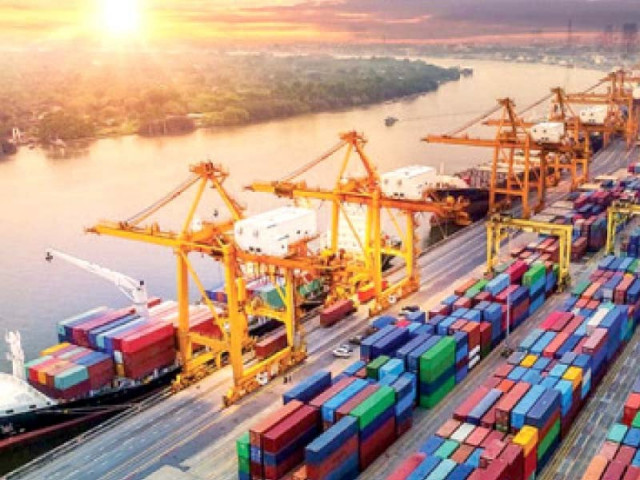Pakistan’s economy to grow 4%
Asian Development Bank projects growth slowdown, double-digit inflation

The Asian Development Bank (ADB) has said that Pakistan’s economy will slow down to 4% in the current fiscal year - the fifth lowest rate in South Asia - and inflation will remain in double digits amid worries that increasing prices can undermine growth prospects.
Pakistan’s economic growth rate will moderate to 4% in fiscal year 2021-22 on weaker domestic demand from monetary tightening and fiscal consolidation, noted Manila-based lending agency in its annual report - the Asian Development Outlook - released on Wednesday.
The projected growth of 4% is lower than the official target of 4.8% set by the government of outgoing Prime Minister Imran Khan.
The report has listed steep currency devaluation as one of the reasons behind the slowing economic wheel.
The rupee dipped to a new historic low at Rs186.13 to a dollar on Wednesday amid a deepening constitutional crisis in the country.
The report said that domestic demand is expected to slow from monetary tightening, restrictions on automobile financing and additional fiscal consolidation measures enacted in January 2022.
The industry growth will decelerate, reflecting fiscal and monetary tightening, a significant depreciation of the local currency resulting in costlier imports of raw material and capital goods, and upward adjustments to domestic oil and electricity prices, according to the report.
Large-scale manufacturing, which accounts for over half of the industry, has weakened since September 2021, with growth slowing to 3.5% in the first five months of current fiscal year from 6.9% in the same period of previous year, it added.
The construction sector, however, is expected to support industry, helped by robust public investment spending and fiscal incentives, and subsidised credit under the government’s Naya Pakistan Housing Programme.
The growth in services is also expected to be trimmed by a slowdown in manufacturing and the implementation of government’s stabilisation programme, weakening this sector’s contribution to growth in this fiscal year.
But the agriculture sector is expected to perform better.
In the last fiscal year, Pakistan’s economy grew 5.6% while Imran Khan’s government ended on Sunday without fulfilling its promise to achieve a sustainable growth of over 6%.
Instead of crossing the 6% growth rate in the current fiscal year, the growth is again on a reverse trajectory.
The ADB said that the current account deficit will increase to 3.5% of GDP (gross domestic product) - a forecast that is lower than the official estimate and the projection of Moody’s credit rating agency that saw it surge to 6% of GDP.
Inflation
The report showed that inflation will remain high, averaging at 11% in the current fiscal year, which is higher than the official target of 8% set by the government.
Even the central bank could not do much to contain inflation, despite price stability being its prime objective now.
The projected 11% inflation is the second highest in the region after 13.3% in Sri Lanka - another South Asian nation that is facing economic conditions largely similar to Pakistan.
The ADB report said that higher inflation in Pakistan was because of higher international energy prices, significant local currency depreciation and elevated global food prices from supply disruptions.
Because Pakistan is a net importer of oil and natural gas, with both comprising almost 20% of total imports, the country would continue experiencing strong inflationary pressure for the rest of the current fiscal year from the jump in global fuel prices related to the Russian invasion of Ukraine, it added.
A prolonged conflict could raise wheat prices and stoke higher food inflation since Ukraine is an important source of Pakistan’s wheat imports.
The ADB said that the mini-budget that the government introduced in January will also cause a one-time rise in prices.
It cautioned that the major risks to the economic outlook are emerging from higher-than-expected inflation due to a prolonged conflict following the Russian invasion of Ukraine.
“If global food and energy prices remain elevated longer than anticipated due to supply disruptions, heightened inflationary pressures could undermine growth prospects in the current and next fiscal year,” it added.
High prices of imported food and energy products will widen the trade deficit, worsening external imbalances and exerting pressure on the local currency.
A larger-than-projected current account deficit and a weaker Pakistani rupee will undermine fiscal consolidation, according to the ADB.
Budget deficit
The ADB said that due to rationalising, less essential current spending and expanding tax and non-tax revenue, the budget deficit could be around 5.7% of GDP in the current fiscal year - a projection that appeared on the lower side.
Imran Khan had announced a Rs246 billion relief package through a reduction in oil and electricity prices.
Published in The Express Tribune, April 7th, 2022.
Like Business on Facebook, follow @TribuneBiz on Twitter to stay informed and join in the conversation..


















COMMENTS
Comments are moderated and generally will be posted if they are on-topic and not abusive.
For more information, please see our Comments FAQ